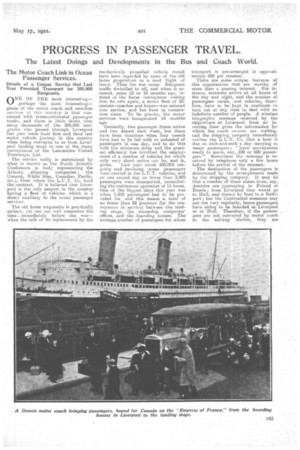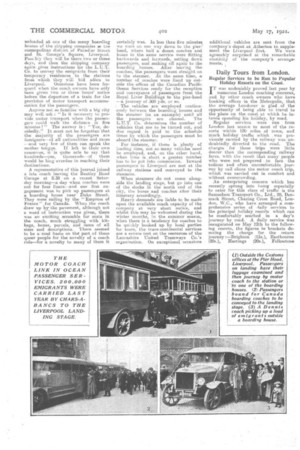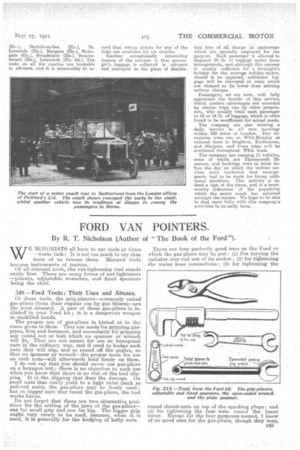PROGRESS IN PASSENGER TRAVEL.
Page 17

Page 18

Page 19

If you've noticed an error in this article please click here to report it so we can fix it.
The Latest Doings and Developments in the Bus and Coach World.
The Motor Coach Link in Ocean Passenger Services.
Details of a Unique Service that Last Year Provided Transport for 200,000 Emigrants.
oNE OF THE most interesting_ perhaps the most interesting— phase of the motor coach and omnibus cervices of this country is that concerned with transcontinental passenger . traffic, and there is little doubt that many thousands of the 2:00,000 emigrants who passed 1;lirough Liverpool last year made their first and their last motor vehicle journey in this country when being conveyed to or from Liverpool landing stage in one of the many conVeyances of the Lancashire United Tramways, Ltd.
The service really is maintained by what is known as the North Atlantic Conference (a body representing the Atlantic shipping companies : the Cunard, White Star, Canadian Pacific, etc.), from whom the L.U.T. Co. hold the contractIt is believed that Liverpool is the only seaport in the country having a fleet of vehicles which is a direct auxiliary to the ocean passenger services.
The old horse ,,vagonette is practically extinct, yet one can well remember the time—immediately before the war— when the talk of its replacement by the mechanically propelled vehicle would have been regarded by some of the old horse proprietors as a marl flight of fancy. Then the war came. Emigrant traffic dwindled to nil, and when it resumed, some 15 or 16 months ago, instead of the horse conveyance coming into its own again, a motor fleet of 23seat-era—coaches and buses—was ushered into service, and has beefs in commission since. To be precise, the motor services were inaugurated 14 months ago.
Generally, two passenger liners arrive and two depart each week, but there have been occasions when four vessels have had to be fed with or unloaded of passengers in. one day, and to do this with the minimum delay and the greatest efficiency has involved, the employment, of a number of vehicles for which only very short notice can be, and is,
given. Last year about 200,000 outgoing and .incoming ocean passengers were carried in the L.U.T. vehicles, and on one record day no fewer than 3,000 passengers were transported, necessitating the continuous operation of 15 buses. One of the biggest days this year was when 1,800 passengers had to he provided for, and this meant a total of no fewer than 82 journeys (by the conveyances in service) between the landing stage, the steamship companies' offices, and the boarding ,houses. The average.,number of passengers for whom
transport is pre-arranged is approximately 600 per steamer.
There are some unique features of this organization that, are worthy of more than a passing interest. For instance, steamers arrive at all hours of the day and night, and the number of passengers varies, and vehicles, therefore, have to be kept in readiness to turn out at any time to 'deal with an indefinite number of people. A wireless telegraphic message received by the shipowners at. Liverpool from an incoming liner gives the information for which the coach owners are waiting, and the shipping company immediately notifies the L.U.T. Co. that a. boat is doe on such-and-such a day carrying so many passengers; " have conveyances ready to move, say, 500 or 600 passengers., ' Sometimes the message is received by telephone only a few hours before the arrival of the steamer.
The destination of the passengers is determined by the arrangements made. by the shipping company. It may be that a number of these aliens from, say, America are journeying to Poland or Russia; from Liverpool they would go to Hull, and thence by boat to a Baltic port; but the Continental steamers may not run very regularly, hence passengers have either to be boarded at Liverpool or at Hull. Therefore, if the pamengem are net conveyed by motor coach to the railway station, they are unloaded at one of the many hoarding houses of the shipping companies logl tne cosmopolitan district of Paradise Street and St. George's Square, Liverpool. Poss:bly they will be there two or three days, and then the shipping company again gives instructions for the L.U.T. Co. to convey the emigrants from their temporary residence.s to the stations from which they will bid adieu to Liverpool. Occasions have been frequent when the coach owners have only been given two or three hours' notice before the departure of a train for the provision of motor transport accommodation for the passengers.
Anyone not so familiar with a big city may well ask : "is it necessary to provide motor transport when the passengers could walk the distance m five minutes!" The answer is "Yes, decidedly." it must nut be forgotten that the majority of the passengers are foreigners—of all nationalities and races —and very few of them can speak the mother tongue. If left to their own resources, it is quite safe to say that hand reds—yen, thousands—of them would be long overdue in reaching their destinations.
A representative of this journal joined a late coach leaving the Bentley Read Garage at 8.30 on a recent Saturday morning—a day when coaches were out for four liners—and our first engagement was to pick up passengers at a boarding house near Duke Street. They were sailing by the "Empress of France " , for Canada. When the coach drew up lay the pavement, although not a word of instruction was given, there was an exciting scramble for seats in the coach, much struggling with kitbags, boxes, parcels, and eases of all sizes and descriptions. There seemed to be a-mad haste on the part of these peer people for the novelty of a coach ride—for a novelty to many of them it
certainly was. In less than five minutes we were on our way down to the pier= head, where half a dozen coaches and buses in the same service were flitting backwards and forwards, setting down passengers, and making off again to the boarding houses. After leaving the coaches, the passengers went straight on to the steamer. At the same time, a number of coaches were lined up outside the offices of tho Canadian Pacific Ocean Services ready for the reception and conveyance of passengers from the Royal Liver Buildings to the pier-head —a journey of 300 yds. or so.
, The vehicles are employed continuously between the boarding houses .and the steamer (as an example) until all thepassengers are cleared. The L.T.T.T. Co. determines the number of vehicles that are to be turned out, and due regard is paid to the schedule times by which the passengers must be aboard the steamer.
For instance, if there is plenty of loading time, not so many vehicles need be employed, and, on the other hand, when time is short a greater number has to be put into commission. Inward passengers to Liverpool are met at the railway stations and conveyed to the steamers.
When steamers do not come alongside the landing stage, but go into one of the docks in the north end of the city, the buses and coaches alter their itinerary accordingly. Heavy demands are liable to be made upon the available coach capacity of the company at very short notice, and whilst this may be welcomed during the winter months, in the summer season, when there is a tendency for coaches to be quickly booked up by local parties for tours, the trans-continental services are a severe test on the resources of the Lancashire United Tramways Co.'s organization. On exceptional occasions additional vehicles are sent from the company's depot at Atherton to supple ment the Liverpool fleet. We were agreeably surprised at the remarkable elasticity of the company's arrangements. .
Daily Tours. from London.
Regular Services to be Run to Popular Holiday Resorts on the Coast.
rr was undeniably proved la,st year by 1 numerous London coaching concerns, and by other coach owners who have booking offices in the Metropolis, that the average Londoner is glad . of the opportunity of being able to travel to the place on the coast at which he intends. spending his holiday, by road.
Regular services were run from London last season to most of the resorts within 120miles of town, and much holiday traffic which was previousl/ carried by the railway was undoubtedly diverted to the road. The charges for these trips were little dearer than the corresponding railway fares, with the result that many people who were not prepared to face the tedious and' often uncomfortable journey by rail chose the motor coach trip, which was carried out in comfort and without overcrowding.
An enterprising concern which has recently sprung into tieing especially to cater for this class of traffic is the Samuelson Transport Co., Ltd., 28, Denmark Street, Charing Cross Road, Leindon, W.C., who have arranged a comprehensive series of daily services to the principal holiday resorts which can be comfortably reached in a day's journey by road. A daily service was inaugurated on May 12th to the following resorts, the figures iv brackets denoting the charge for the return journey :—Brighton (15s.), Eastbourne (20s.), Hastings (20s.), Folkestone (21s.), Bexhill-on-Sea (21s.), St.
Leopards (21s.), Margate (2,5s.), Ramsgate (25s.), Broadstairs (25s4, Bournemouth (35s.), Lowestoft (37s. 6d.). The. seats on all the -coaches are bookatile in advance, and it is noteworthy to re cord that refin;:p tickets for any of the trips are available for six months.
Another exceptionally interesting feature of the services is that passenger's luggage is collected in advance and conveyed to the place of destitia tion free of all charge in motervauf wthich are specially employed for the purpose. Each passenger is allowed to dispatch 56 lb. of luggage under these arrangements, and although this amount is usually sufficient for a fortnight's holiday for the average holiday-maker, should it he required, additional luggage will be conveyed at rates which areclaimed to be lower than existing railway charges.
Passengers, we are sure, will fully appreciate the benefit of this service, which confers advantages not accorded by similar trips ran by other proprietors, who usually limit each passenger to 12 or 14 lb. of luggage, which is often found to be insufficient fur actual needs The company are also running a daily 'service to all race meetings within 100 miles of Loudon_ Day excursions were run on Whit-Monday at reduced fares to Brighton, Eastbourne, and .Margate, and these trips will be continued throughout Whit week.
The company are running 11 vehicles, some of which are Thornycroft 2Bseaters; and bookings were so brisk be'fore the day on which the various services were instituted that arrangements had to be made for hiring additional machines. This activity is indeed a sign of the times, and is a trustworthy indication of the popularity which the motor coach has achieved amongst the masses. We hope to be able to deal more fully with this company's activities in an early issue.
































